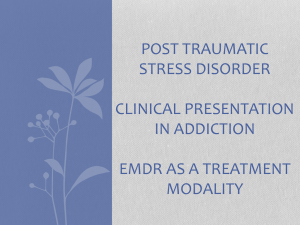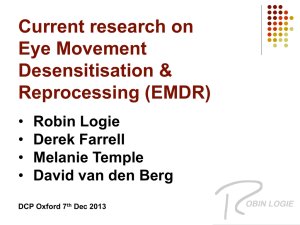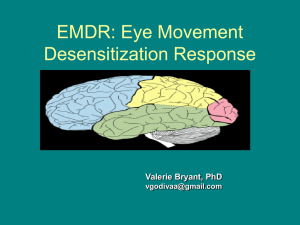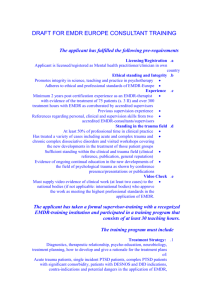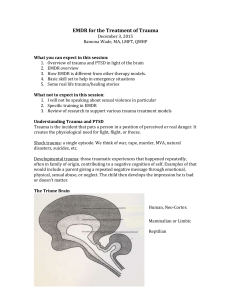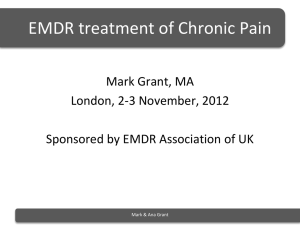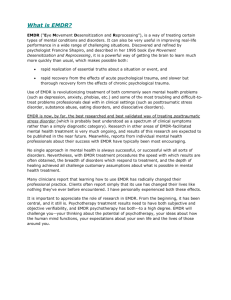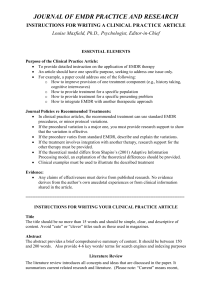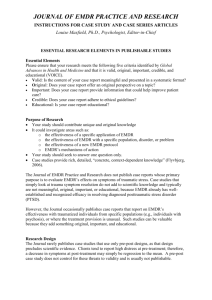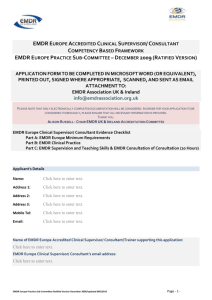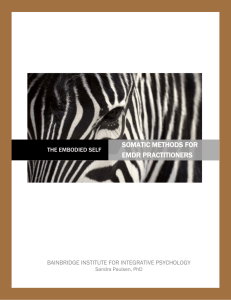References - Syncopation
advertisement
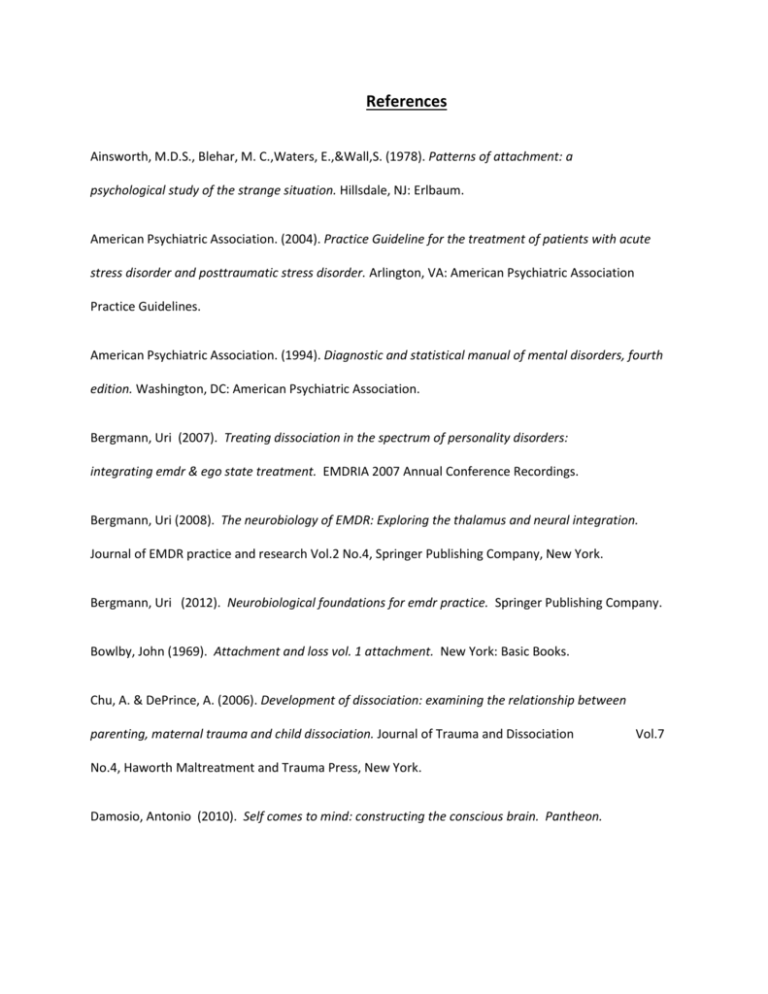
References Ainsworth, M.D.S., Blehar, M. C.,Waters, E.,&Wall,S. (1978). Patterns of attachment: a psychological study of the strange situation. Hillsdale, NJ: Erlbaum. American Psychiatric Association. (2004). Practice Guideline for the treatment of patients with acute stress disorder and posttraumatic stress disorder. Arlington, VA: American Psychiatric Association Practice Guidelines. American Psychiatric Association. (1994). Diagnostic and statistical manual of mental disorders, fourth edition. Washington, DC: American Psychiatric Association. Bergmann, Uri (2007). Treating dissociation in the spectrum of personality disorders: integrating emdr & ego state treatment. EMDRIA 2007 Annual Conference Recordings. Bergmann, Uri (2008). The neurobiology of EMDR: Exploring the thalamus and neural integration. Journal of EMDR practice and research Vol.2 No.4, Springer Publishing Company, New York. Bergmann, Uri (2012). Neurobiological foundations for emdr practice. Springer Publishing Company. Bowlby, John (1969). Attachment and loss vol. 1 attachment. New York: Basic Books. Chu, A. & DePrince, A. (2006). Development of dissociation: examining the relationship between parenting, maternal trauma and child dissociation. Journal of Trauma and Dissociation No.4, Haworth Maltreatment and Trauma Press, New York. Damosio, Antonio (2010). Self comes to mind: constructing the conscious brain. Pantheon. Vol.7 Forgash, C. & Copeley, M. (editors) (2008). Healing the heart of trauma and dissociation with emdr and ego state therapy. Springer Publishing Company, New York. Freyd, Jennifer (1996). Betrayal trauma: the logic of forgetting childhood abuse Harvard University Press, Cambridge. Gleick, James (2012) The information: a history, a theory, a flood. Vintage Books. Korn, D. L., & Leeds, A. M. (2002). Preliminary evidence of efficacy for emdr resource development and installation in the stabilization phase of treatment of posttraumatic Journal of Clinical Psychology Vol.58 Issue 12 pgs. 1465-1487, Wiley stress disorder. Periodicals Inc.. Kahneman, Daniel (2011). Thinking, fast and slow. Farrar, Straus, and Giroux. Kitayama, Shinobu & Cohen, Dov (2007). Handbook of cultural psychology. The guilford press. Lee, C. (2008). Crucial processes in EMDR: more than imaginal exposure Journal of EMDR practice and research Vol.2 No.4, Springer Publishing Company, New York. Liotti, G. (2006). A model of dissociation based on attachment theory and research. Journal of Trauma and Dissociation Vol.7 No.4, Haworth Maltreatment and Trauma Press, New York. Lyons-Ruth et.al.(1999). Identification with a hostile or helpless attachment figure: additional correlates of infant disorganization in the AAI. Attachment and Psychopathology(Vol.2). Cambridge UK: Cambridge University Press. Marcel, Gabriel (1950). The mystery of being: vol. 1, reflection & mystery, vol. 1. The Harvill Press, Ltd. Marcel, Gabriel (1951). The mystery of being: vol. 2, faith & reality. The Harvill Press, Ltd. Maxfield, L., et.al. (2008). A working memory explanation for the effects of eye movements in EMDR. Journal of EMDR practice and research Vol.2 No.4, Springer Publishing Company, New York. Maturana, Humberto, R. & Varela, Francisco J. (1987) The tree of knowledge: the biological roots of human understanding (revised edition). Shambhala. Ogden, P., et.al. (2006). Trauma and the body: A sensoriomotor approach to psychotherapy. W.W. Norton & Co., New York. Propper, R., & Christman, S. (2008). Interhemispheric Interaction and Saccadic Horizontal Eye Movements. Journal of EMDR practice and research Vol.2 No.4, Springer Publishing Company, New York. Reik, T. (1945). The compulsion to confess: on the psychoanalysis of crime and punishment. Grove Press Inc. New York. Shapiro, F. (2001). Eye movement desensitization and reprocessing: basic principles, protocols, and procedures, second edition. The Guilford Press, New York. Shapiro, F. (2009). EMDRIA 2009 Annual Conference. Atlanta, 2009. Shore, A. N. (2003). Affect dysregulation and disorders of the self. W.W. Norton & Company, New York. Shore, Bradd (1996). Culture in mind: cognition, culture, and the problem of meaning. Oxford University Press. Siegel, D. (1999). The developing mind: how relationships and the brain interact to shape who we are. The Guilford Press, New York. Siegel, D. (2007). The mindful mrain: reflection and attunement in the cultivation of well-being. W.W. Norton & Company, New York. Solomon, J. & G., Carol H. (1999). Attachment disorganization. The Guilford Press, New York. Solomon, R. & Shapiro, F. (2008). EMDR and the adaptive information processing model. Journal of EMDR practice and research Vol.2 No.4, Springer Publishing Company, New York. Strogatz, Steven (2000). Sync: how order emerges from chaos in the universe, nature, and daily life. Hyperion. Thomson, Evan (2007). Mind in life: biology, phenomenology, and the sciences of mind. Belknap Harvard. Tomkins, Silvan S. (1995). Exploring affect: the selected writings of sylvan s. Tomkins. Cambridge University Press, Cambridge. Tononi, Giulio. (2012). PHI: a voyage from the brain to the soul. Tulving, Endel F. (2005). The oxford handbook of memory. Oxford University Press, Oxford. Varela, Francisco J., Thompson, Evan, & Rosch, Eleanor (1993) The embodied mind. The MIT Press.
